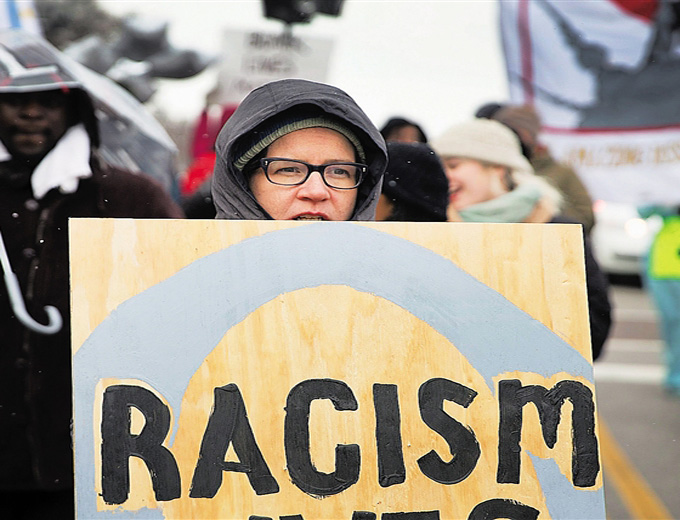A long march toward equality
- By Shen Dingli
 0 Comment(s)
0 Comment(s) Print
Print E-mail China.org.cn, December 17, 2014
E-mail China.org.cn, December 17, 2014

The recent cases of white cops killing two black people, Michael Brown and Eric Garner, have set off a wave of nationwide protests across the United States. This is the latest outbreak resulting from widespread grievance of social injustice widely existing in the U.S.
For a long time, social inequality has prevailed in the states. When the Caucasians first landed on the new continent a few centuries ago, they started their suppression of the local aboriginals. With well-planned schemes and vicious methods, the European immigrants took over the continent and tens of millions of Indians lost their lives. In addition, the slavery system prevailing in the country further ashamed the United States. At a time when slaves were not viewed as human but property, the notion that "all men are born equal" would naturally not be applicable to them.
It took a long time to set slaves free, as even one of the forefathers of the union, President Thomas Jefferson, used to house a slave at his home. It took President Abraham Lincoln's life to eventually set the slaves free. With the state law of "free but separate" in many places in America, however, people were still judged and treated in terms of their color not their intelligence or contribution. Were it not for Rosa Parks' imprisonment for her refusal to observe the local segregation law in Alabama, it might have taken longer for Dr. Martin Luther King, Jr. to speak out his dream. While waging the Vietnam War, President Lyndon Johnson's administration addressed such social injustice through legislative reform.
On the surface, America's civil rights have improved a lot since the 1950s and 1960s. People now have to be sensitive to political correctness, when talking about gender, faith and employment. In fact, African Americans have much lifted their portfolio on the U.S. political stage. Barack Obama, an African-American, has been elected as the President. General Colin Powell has served as Chief of Joint Staff, and he and Dr. Condoleezza Rice have served as U.S. Secretary of State. Additionally, both Dr. Condoleezza Rice and Dr. Susan Rice have served as National Security Advisors. All these political figures have African heritage.
Despite such an improvement, social injustice and racial discrimination are still deeply rooted in America, now in a more covert and even "legal" manner. For instance, before the civil rights movement a half century ago, black people in the United States didn't have equal voting rights, and were intimated by racist organizations. They were even forced by law to be separate from the white people in some schools and many public spaces. Compared with such open discrimination, current racial issues are more covert – they appear more in the criminal prosecution process, in terms of formality and substance.
Both the Brown and Garner cases caught public attention as the grand juries for each case decided not to prosecute the white policemen. On the one hand, the grand jury, which was called spontaneously, has to some extent been democratically representative. However, for many cases where African Americans have confronted white policemen in court, the grand jury has decided not to indict the police. Statistically, it is not coincidental that the grand juries are often dominated by the white community. Ironically, the opposite is occasionally true. When O. J. Simpson was ruled not guilty by the court in 1995 for the death of his wife, Nicole Brown Simpson, the grand jury was made up mostly of members of the black community.
In a realm of social science rather than natural science, there is no way to reliably and scientifically measure the ability of each jury to command the law, and to test if they are racially biased or not. Then the long lingering social bias could reach a critical tipping point that would trigger public protests and even social unrest. The white police were not completely wrong when they shot and killed the victims, but they are not always right. Nevertheless, the American legal system that would often yield to a grand jury decision not to hold a policeman who unnecessarily killed a black man accountable has made the United States an institutionally racist country.
Such institutional racism is different from the days of Martin Luther King as the racial discrimination at that time was obvious and easily. The present "racial institutionalism without a racist" is far more difficult to identify and reform. As an African American, President Obama could well become a bridge between various ethnic groups and communities. However, his dilemma is that he has to defend the current legal system which is inherently flawed. Clearly, the Brown and Garner cases won't be the last ones, and American march toward true human equality and social justice will be a long process.
The writer is a columnist with China.org.cn. For more information please visit:
http://www.keyanhelp.cn/opinion/shendingli.htm
Opinion articles reflect the views of their authors, not necessarily those of China.org.cn.





